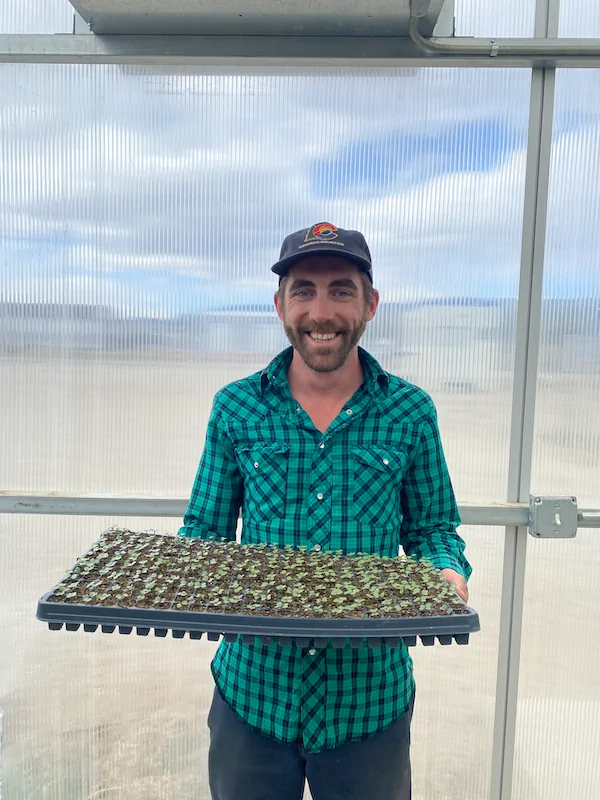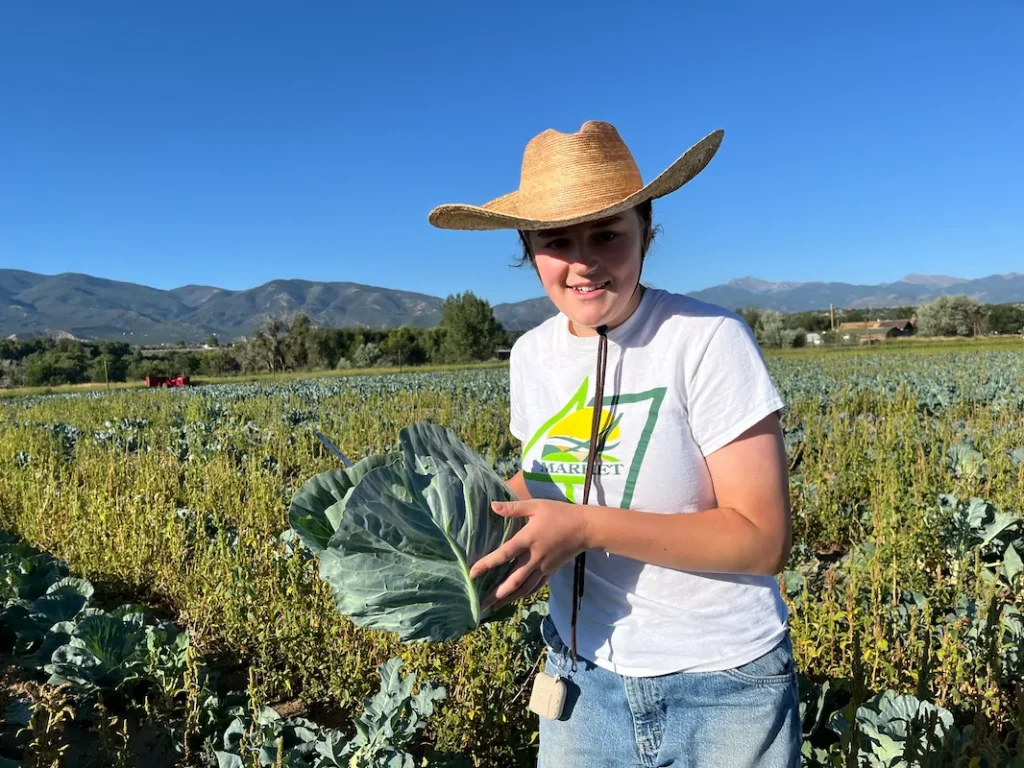Colorado Farm to Table Gives Everything It Grows to the Hungry
A line of hungry people formed outside the Arkansas Valley Christian Mission in Buena Vista. They shifted their feet in silence, waiting for the doors to open.
The Mission is known for serving hot lunch to hundreds of neighbors in need, three times a week, at no charge. It also provides a food pantry where a growing number of struggling families, older adults, military veterans, and unhoused seasonal workers can shop for free. No questions asked.
Cathy Storey, volunteer food coordinator for the Mission, finished restocking the food pantry shelves. She stepped back and smiled, admiring the latest donation. “It’s like Christmas in August,” she said, knowing how much her clients would appreciate the wish list items.
Cathy unlocked the front door and greeted folks as they filed into the small building. When her clients spotted the full pantry shelves, their faces lit up.
“The vegetables are in!” a woman cried out in delight, pointing to the cabbage, broccoli, and sweet corn hand-picked that morning. Shoppers began to chat excitedly, sharing recipes they were eager to try.
An older man selected a firm cabbage. “It’s so good,” he said. “I just eat it raw with a little salt.” A young mother chose a large head of broccoli to feed her children.
The nourishing produce was grown and harvested by Colorado Farm to Table, a nonprofit dedicated to providing the freshest vegetables to people in need. For nearly 30 years, the small farm in Salida has donated everything it grows to a network of more than 20 nonprofit distribution partners — including churches, food banks, community centers, and community meal providers — with priority given to nearby Chaffee County programs.
Since its founding, Colorado Farm to Table estimates it has fed more than half a million low-income individuals across the state.
ROOTED IN COMPASSION
It all started in the 1990s when career farmer Tony Madone, Jr. noticed that most donations to food pantries were processed foods that held little nutritional value and were about to expire. Of the small number of vegetable donations, many were bruised seconds on the verge of going bad.
Tony felt his hungry neighbors deserved better than stale leftovers. In 1996, he planted a 2-acre garden plot in Salida and donated his entire harvest to local food pantries. Tony wanted people who shopped at food banks or ate at local soup kitchens to know that a farmer was growing vegetables just for them. He wanted them to know someone cared about their health and well-being.
By 2005, Tony moved the farm to its current 15-acre location north of Salida. The following year, he formed the nonprofit Colorado Farm to Table, with a mission to “sustainably grow nutritious vegetables for donation to those in need of healthy food throughout Colorado.”
To many, the phrase “farm to table” is associated with pricey cuisine served by chefs at expensive urban restaurants to the privileged few. But when Tony named the nonprofit back in 2006, he chose Colorado Farm to Table to describe its purest intention: the delivery of fresh vegetables straight from his farm to the tables of less-fortunate Coloradans. Tony was determined to provide equal access to nutrition for all.
In 2014, Tony hired Thomas “T.J.” McDaniel, a young farmer from Kansas who deeply connected with Tony’s humanitarian mission. Over the years, Tony taught T.J. everything he knew. And before retiring from Colorado Farm to Table in 2020, Tony promoted T.J. to farm manager and director, leaving the nonprofit in good hands.
“Tony had a vision,” T.J. said of his mentor, “and I’m here to see it through.”
THE GROWING NEED
Food insecurity has been on the rise in Colorado since the pandemic began in 2020. The Colorado Blueprint to End Hunger reports, “Many [Coloradans] are struggling due to low incomes, lack of affordable housing, chronic health conditions, and other life storms — and such circumstances can lead to difficult choices, like having to pay rent instead of purchasing nourishing foods.”

A recent Colorado Health Foundation poll found that two in five — nearly 40% — of Coloradans were worried about affording food. And the Colorado Children’s Campaign reported that one in six Colorado families said their children were not eating enough food because it wasn’t affordable. These challenges are even more pronounced among communities of color.
“Every partner agency says their demand has been increasing for several years now,” T.J. confirmed. “I have yet to find a single food pantry, or food bank, that says they need less. They all say, ‘We can always use more fresh produce if you’ve got it.’”
CULTIVATING CAPACITY
At Colorado Farm to Table, the biggest challenge isn’t bad weather or pests that threaten to destroy crops. “Our biggest challenge is funding,” said Laurie Kari, executive director of Colorado Farm to Table since 2023.

Laurie was quick to thank the Shine family, who have generously donated the use of their farmland for nearly two decades and counting. She said that every donated dollar, or in-kind equivalent, makes a big difference.
T.J. agreed. “Donations helped us hire Laurie part-time, which allowed us to do more grant writing, which brought in new funding to help purchase a reliable tractor, which improved our productivity and yield,” he said, demonstrating the ripple effect.
Although Colorado Farm to Table has access to 15 acres, the nonprofit can only plant and harvest 10 acres given its current budget and staffing constraints. The ability to hire a farmhand, T.J. said, would be a game changer.
“Increasing our funding would increase capacity, which would feed more people,” Laurie said. “There’s a lot of room for growth.”
Even on the farm’s modest budget, T.J. — with the help of two part-time interns and a crew of loyal volunteers — manages to plant, grow, tend, and harvest around 100,000 pounds of fresh vegetables annually.
“It’s not enough,” T.J. stated, after loading several palettes of cabbages and broccoli onto a semitruck for Food Bank of the Rockies. The Denver nonprofit will share its haul among smaller food pantries in the metro area.
“We filled the Denver Rescue Mission’s truck the day before,” T.J. said, “and we have a local homeless shelter coming tomorrow.”
When the vegetables are ready to pick, T.J. must time each harvest perfectly to maximize yield, leverage available volunteer labor, and share the produce fairly among the many food pantries in need. And because the farm lacks a cold storage area, there’s little room for error.
In addition to trucks coming from Denver, other nonprofit groups have driven all the way from Pueblo, Colorado Springs, Alamosa, Montrose, Fairplay, and Dillon, to pick up vegetables at the Salida farm. “We make sure everybody gets something,” T.J said.
THE REAL HEROES
“We couldn’t do it without volunteers,” T.J. emphasized, acknowledging the thousands of hours they contribute to Colorado Farm to Table each year.
“I can irrigate, I can work the fields, I can cultivate, but there’s no way I could ever get that all planted by myself,” T.J. explained, pointing at row after row of healthy crops. “The farm would be buried in weeds if volunteers weren’t going up and down the rows hoeing by hand. There’s absolutely no way I would ever get it harvested and loaded on my own.”
Penny Meierdirk, a longtime volunteer with Colorado Farm to Table, showed no signs of slowing down as she bent her back to the work of harvesting another head of broccoli. “We are really close to producing 3 million pounds of food from this field,” she said, the milestone a source of intense pride.
“Over the years, I’ve done almost every part of volunteer work on the farm. One time, I even took two cases of corn on the back of my motorcycle to a tiny food bank when it first opened in Westcliffe.”
Penny always looks forward to Community Gleaning Day, where anyone can pick whatever is left in the fields at the end of the summer. The free event ensures nothing goes to waste at Colorado Farm to Table.
“This year, I imagine we’re going to have a lot of people show up for that again,” Penny said. “The years when inflation and hardship is greater, we have a lot more people come out.”
FEEDING MORE THAN STOMACHS
Back at the Arkansas Valley Christian Mission, hungry shoppers migrated from the food pantry into the dining area for lunch. In addition to stocking the Mission’s pantry shelves with quality vegetables, Colorado Farm to Table provides fresh ingredients that go into the hot meals served three times each week. Cabbage is often made into delicious soups, sauerkraut, and coleslaw. Zucchini goes into hearty stews, casseroles, and bread.
“Many of our clients have nutritional needs, medical needs, and Colorado Farm to Table provides the healthiest food,” Cathy said, noting that the Mission’s food pantry is often her clients’ only source of fresh produce. “They consider vegetables a treat.”
Cathy said it felt good to know that nonprofits like Colorado Farm to Table exist in the world. “They really care about the health of their neighbors and want to make a difference. By growing and donating these vegetables, it tells our clients that their lives matter.”
The farm’s outreach, she added, feeds more than just empty stomachs.
“What starts with the farmer planting a single seed has such a far-reaching effect on the physical and mental health of our community,” Cathy marveled. “I’ve seen the gift of vegetables touch so many lives. It’s amazing to be part of it.”
To learn more about Colorado Farm to Table or to make a donation, visit coloradofarmtotable.org.
Becky Jensen is a writer who lives and works in a little cabin on a big river in northern Colorado. She’s also a proud member of Poudre Valley REA. You can find her at beckyjensenwrites.com.










